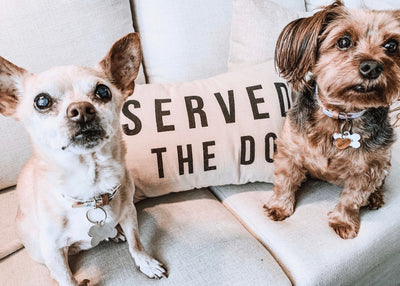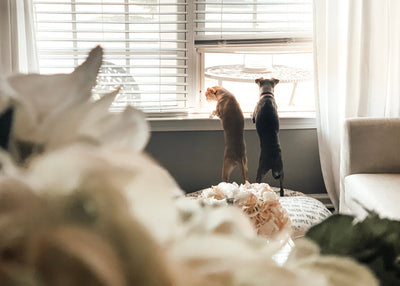What To Expect When You Are Expecting...A Rescue Dog

Congratulations! So you've decided to adopt a dog from your local shelter or rescue. The universe praises you. Good job, Babe, good job. Now that the decision has been made, what should you expect?
If you follow us on Instagram, then you know we just went through the rescue adoption process with our newest family members, Dylan and Delilah. So in this post, we are going to give you an inside peak on the process.
Dog Adoption Prework
Before you even start to contact animal shelters and rescue centers, you need to have a family meeting. Call everyone together (even if it's you, yourself, and well...just you) to do some research on which type of dog breed and size would be most appropriate for your household.
Do not, under any circumstances, go to a shelter all willy nilly to pick a dog. Why? Because as soon as you step foot inside, you are going to be hit with the strongest wave of adopt-all-of-the-dogs, can-I-pet-that-dog, I-must-have-that-dog

Timelines And Adoption Steps
As for as adoption timeline specifics, they will differ between facilities. In some cases you'll be able to meet your new roomie and take them home within a matter of hours; if not minutes. In other cases, it may take a few days to just get approval process in order to meet the rescue dog you have in mind.
In our particular case, it was a couple of days before I qualified to meet the twins. I had to complete a rather in-depth application which included a request for personal references and my current vet's contact information. The rescue reviewed my application and contacted all of the partners I referenced before allowing me to meet the puppies.
Once you pass the application process and have selected your rescue, adoption fees willy vary by institution and dog age.
In general, municipal pounds and shelters have lower adoption rates which range from $60 to $120 per dog. For non-for-profit organizations, standard fees tend to be on the higher side: $200 to $400 per dog. Also, keep in mind that senior dog adoption fees tend to be greatly reduced. In same cases, institutions will waive the fee completely for senior dogs to help encourage placement.
On the opposite end of the age scale, keep in mind that puppy adoption fees may be on the higher side because of high demand.
Hi My Name Is...Rescue Dog Introductions
It's important to involve as many members of your family as possible when it comes time to meet your potential rescue dog. However, it is paramount that you include any dogs you currently own during these introductions. So be sure to inquire of the shelter how you can appropriately include your current fur kid.
It is not advised to randomly bring a rescue dog home to your current dog. Your dog considers your home his home. So introducing a new pet to him for the first time on his turk could result in enhanced resistance and territorial

Ideally, you want to introduce the dogs to each other in a neutral space like a meeting room at the shelter or at a park if the rescue dog is currently residing with a foster family. Taking this step will help to place both dogs on equal footing and keep them in a better headspace when making introductions.
Another good question to as at this stage is if there are any trial period available which would allow you to bring the rescue home for a few days prior to completing the adoption process. This is a great way to allow your family to spend a few days getting to know your potential rescue pup and confirm the match.
Keep in mind it usually takes a dog two to three days to relax and ease into a new space. The shelter we worked with allowed us to spend a full seven days with Dylan and Delilah before formalizing the adoption. This trial period together was so beneficial as it allowed Dylan and Delilah to show us more of their true personalities and it allowed Paris to decide if she liked having twins siblings around.
Welcome to The Brady Brunch
When it comes to including a rescue dog into your family, consider it similar to you inviting someone from another country to suddenly live with you. They speak a different language, have different customs and have their own set of boundaries. And least us not forget this new person is going to have their own personality as well; which may or may not mesh with yours. So needless to say, it's going to take a few months for both of you to get on the same

The same scenario applies to your current dog and your rescue dog. And the older either dog is, the more time it's going to take for them to come to an understanding. You need to do your part to help them along but keep in mind that it will take time.
In our case, I actually went looking to adopt one small friend around Paris' age to keep her company. I am definitely of the belief that you should always get your dog a dog. I find that with the proper training, my dogs are much happier when they have a fellow fur ball in crime.
But when I learned about The Chiggies, their background and their needs, I realized that our home might be a really good match.
They were still young (six months), so it was early enough to ensure they are well socialized and give them some basic lessons in manners. They were littermates who had been purchased together by one owner a few months ago. As such the shelter wanted to keep them together; which is why they had not been adopted yet. They would also do best in a home with older children or no children due to their quirky personalities and small size. And lastly, they could really use the help of an older dog to show them the ropes and clean up their

In a later post I'll talk more about the challenges of introducing multiple dogs into your home; as well as the challenge when raising littermates. Both of these factors can be huge detailers if you’re not prepared. But in general I'll say now, adopting two dogs at once is very challenging. It can be done well but it is not for dog novices or the faint of heart.
Prior to adopting Dylan and Delilah, I've owned three other dogs. Coco, Paris and a sweet pitbull named Mu. So I've been around the block a few times when it comes to housebreaking, obedience training and the riggers of dog ownership. As such, the idea of training two puppies at once with the help of Big Sister Paris didn't seem too arduous. But it is hard work; especially in the beginning. So I would not recommend it if you don't know what you're doing.
Whelp, that's the adoption process from beginning to end. I hope you found this post helpful. If you have any adoption questions which I didn't answer here, feel free to drop them below!
And remember, whoever you bring home will likely be a part of your family for the next six to ten years; if not longer. So be fair to them and you as you navigate the rescue adoption process.
![Is Now a Good Time for Me to Get a Dog or Puppy? [Things to Consider]](http://lindseyandcoco.com/cdn/shop/articles/Paris_and_Lindsey_400x.jpeg?v=1593125675)
![So You Brought Home a New Dog...Now What? [Tips for the Transition to Dog Ownership]](http://lindseyandcoco.com/cdn/shop/articles/Welcome_Home_Paris_a751f494-1e64-4fd4-976d-ec5c2471b843_400x.jpeg?v=1593283799)


![Helicopter Dog Moms Prepare For Take Off [6 Ways To Ease Your Return To Office]](http://lindseyandcoco.com/cdn/shop/articles/015708F9-341A-4EA5-9251-A33F5D4342AA_400x.jpg?v=1628705258)

![How To Care For A Dog With Sensitive Skin [Common Causes For Itchy Skin In Dogs]](http://lindseyandcoco.com/cdn/shop/articles/6FDB9B87-AF4E-4FE7-85BA-2D47B384F4C2_400x.jpg?v=1641586721)
![How To Work From Home With Multiple Dogs [And Stay Employed]](http://lindseyandcoco.com/cdn/shop/articles/IMG_6840_c04a5036-f3e9-44c7-92b2-bcdf8c34b857_400x.jpg?v=1749734000)